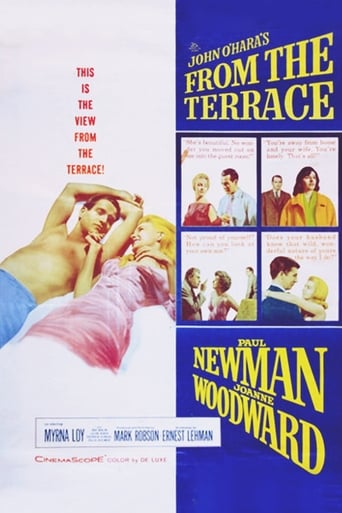SimonJack
"From the Terrace" is an example of a type of the melodrama that Hollywood turned out from the late 1950s to early 1970s. Films such as this and "Peyton Place" of 1957, "Home from the Hill" of 1960, "Breakfast at Tiffany's" of 1961, and others came close to being soap operas. They had the good and the bad, often in the same person or people. The stories were different and usually interesting enough to hold an audience's attention. But the plots were definitely more melodramatic than good drama or story telling. Romance was usually a part of all of them, and most often they were about struggles in marriage, infidelity, family breakups, etc. The usual stuff of soapers, under various genres. This one is a lavish production by 20th Century Fox, based on a novel by John O'Hara. It hits on another theme that was common in the Mid- 20th century – after WW II and Korea. A man, striving to get ahead, becomes a workaholic and in the course neglects his wife. Not all wives are unfaithful to hubby, as is Joan Woodward's Mary St. John. And, not all men wind up unfaithful to their wives as does Paul Newman's David Eaton. Having seen this film when it came out in 1960, as I recall, I might have seen Newman as the poor hero and good guy whose wife dumps on him. But, it's amazing how time and a little maturity yields some wisdom. Because the blame for the breakup of the marriage here is definitely Newman's Eaton. He knew the woman he married, and his ambition and drive led him to forget her. It doesn't excuse her carousing and infidelity, but it shows what led to that. This film probably is viewed as very slow by 21st century audiences. It has some glamorous sets. The cast is very good, especially Joanne Woodward. She was one of the most talented actresses of the 20th century. Paul Newman was a fine leading man in a variety of genres, and a good entertainer. But his acting wasn't anything exceptional. The young Ina Balin won a Golden Globe as the most promising newcomer in 1960. She was in some good movies after this, but her star never quite reached to the heavens. She died at age 52 of a heart problem.Others of the supporting cast are very good. Leon Ames has a fine role as Samuel Eaton and Myrna Loy has a small part as his wife, Martha Eaton. Elizabeth Allen is the flamboyant, brassy rich broad, Sage Rimmington. She plays the part well, and it's the only way to describe her. Patrick O'Neal is Mary St. John's lover on the side. Felix Aymer is very good as David Eaton's boss and the head of the blue blood, Wall Street, and wealthy MacHardie's, James Duncan MacHardie. In an exchange with Eaton, MacHardie articulates a wise philosophy that had guided civilization for centuries. James MacHardie, "There are no grounds for divorce. And if you need my personal theology, infidelity is the lesser sin. I will do anything in my power to prevent a divorce." David Alfred Eaton, "Including condoning infidelity?" MacHardie, "I consider your word 'condoning' disrespectful. I condone none of it. The problem of infidelity is between husband and wife and God. The problem of divorce concerns the whole of civilization. What is marriage? An exchange of vows, a contract. It is my duty to myself and to any man who is working for me to demand that he honor all of his contracts. When you came here, you found out that we always honor our word, even if it means taking a loss." Many of these films, of course, are about well-to-do if not outright filthy rich people. In this film, David and Mary live a high life style. One might wonder where they got the money in their early stage. But, they live and socialize in high society, and among the young rich – two different groups. I don't know how that may resonate with audiences in the 21st century, when most people seem to live as much for fun and entertainment as for family or other things. But back then, the folks who lived the high life were quite distant from the vast majority of people, and they often were the envy of the common man.
Dalbert Pringle
Over these many years I have been told, time & again, about what a really great actor Paul Newman was in his heyday.Well, I have now seen Newman in 6 films that all came from the first decade of his acting career, and, let me tell you, I am not at all impressed. In fact, I'd actually go so far as to say that Newman was one of most over-rated and disappointing, big-name actors from that particular era, bar none.Set in the year 1946, From The Terrace was yet another star-vehicle of Newman's where I strongly felt that, at 35, he was clearly too old for his part. This time around he played a young soldier returning to his Philadelphia home after the war.The very minute Newman's character (a spoilt, tormented rich kid named Alfred Eaton) sets foot inside the door of his home the story immediately accelerates into a most tedious and predictable soap opera of non-stop bickering, jealousy and resentment, with a generous dash of infidelity thrown into the mix for good measure.Everybody in this story seems to either have an axe to grind, or be out for blood, or at one another's throat, ceaselessly.I, for one, found this 1960 film (with its plodding 145-minute running time) to be a tiresome ordeal which went far beyond anything even reasonably tolerable.Paul Newman, or not, I would never, ever recommend this bitchy, backstabbing bull to anyone.
bobbyhollywood
Have read a few of the other reviews, and I am not trying to write a "review," I am trying to put in my two cents worth about a movie, so that others may take them and use them to their benefit. The actors got me right from the beginning, and they had me by the nose all the way through this. I was with a very nice young lady as we sat in the car, yes in a "drive-in movie," we were hooked, the only necking we did was during intermission when the movie was over. ALL the actors earned their pay, I don't know what the author had in mind when they wrote the story, I don't know what the director had in mind, but - I sure did enjoy what I saw. I thought the ending to be very nice, and the photographic scene to be the most shocking. Rent/buy it if you like romance and a tale about big money because, this is it. My thanks to all who worked on this movie.
j-lacerra
This is a very long melodrama starring Paul Newman and Joanne Woodward, and a host of capable supporting players, based on a John O'Hara novel. Its running time of close to three hours went quite fast for me. The 'plight' of Alfred Eaton (Newman) is somewhat hard to discern for those of us who are not wealthy. That is because of several issues that muddle the plot rather beyond our understanding.First, Alfred has issues with his unloving father. OK, so what? The Eatons are wealthy. But we are told over and over that this is not enough. It is respectability that matters, not money.Second, one notices that everyone drinks constantly and too much.Third, almost all the women in the movie are what we would call sluts; slaves to their carnal urges and in dire need of physical satisfaction often and emphatically. Even the eventual heroine (a miscast Ina Balin) is unsuccessful in resisting her lascivious yearnings.Fourth, Alfred is doggedly in pursuit of wealth and position. It is not explained why, since after the death of his father, ably played by Leon Ames, he is after all the heir to a substantial fortune and business. Nor is his drunken and philandering mother (Myrna Loy, in a small role) ever again mentioned after Alfred leaves his unloving home to make his own fortune.Given these issues, it is hard to sympathize with the main characters or to fully grasp their motivations. None of this makes the picture any less watchable. Newman and Woodward are always first class, and they have great chemistry on screen. And the fact that a cozy Hollywood ending is reached, in which all get what they either deserve or aspire to is good for this kind of sprawling soap opera.An enjoyable diversion into a past era: Hollywood film making of the late 50s - early 60s.







